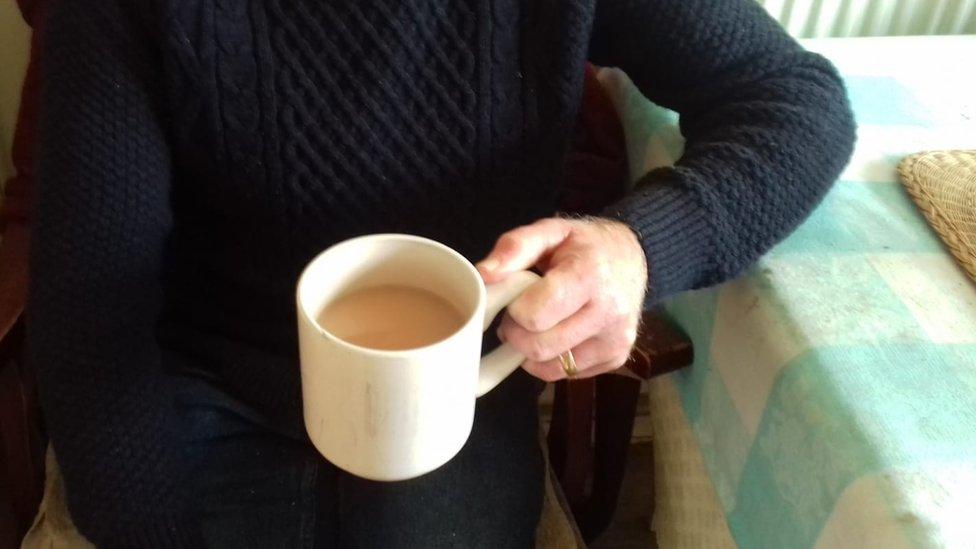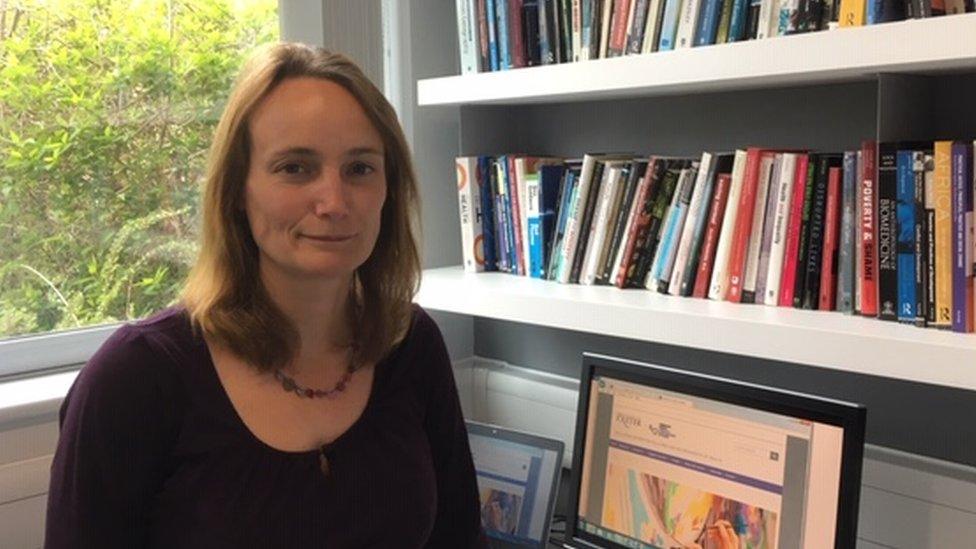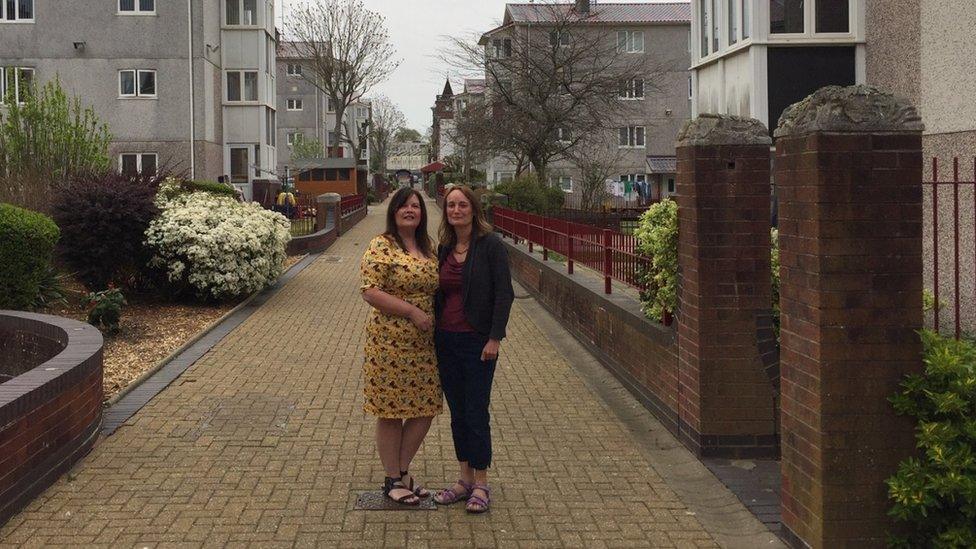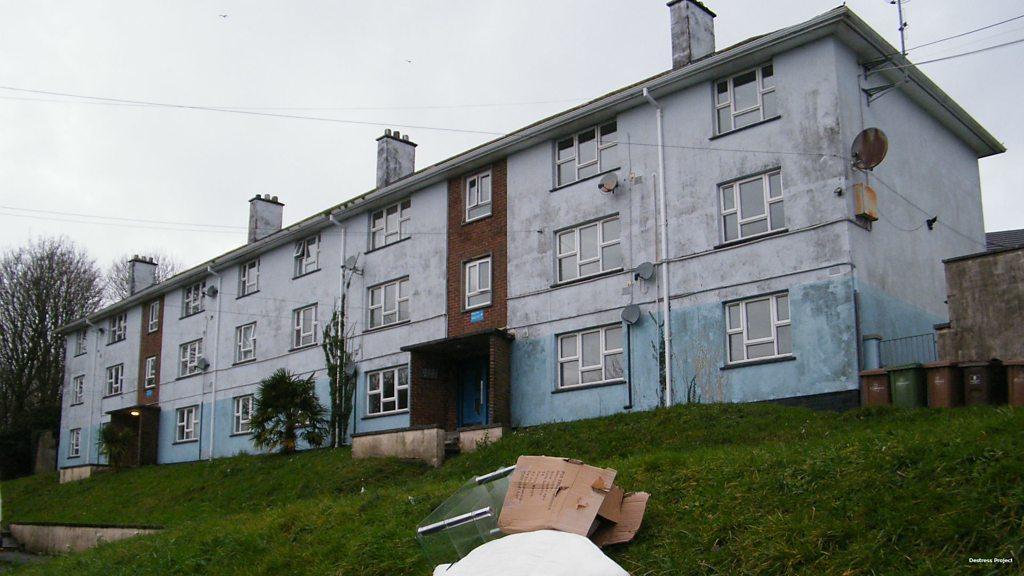Stress from poverty 'over-medicalised'
- Published

More than 70 million prescriptions for anti-depressants were issued in England in 2018 - and low-income areas had some of some of the highest prescription rates.
BBC Radio 4's PM programme meets some of those interviewed for a new study, Poverty, Pathology and Pills, warning against "over-medicalising poverty".
Karen and her husband, Paul, live in Barne Barton, Plymouth. There's plenty of local pride but also rundown housing, problems with drug use and unemployment.
"It's just home to me," says Karen.
Over tea and biscuits, Karen says Paul has been suffering from depression for 25 years - and unemployment was the trigger.
"Because he was down, he couldn't get a job - but he was down because he didn't have a job. It was a circle, a constant circle," she says.
Paul spent years on anti-depressants of one form or another. Karen says medication made him like a "zombie".
"I'm not sure if they worked...he was like a Zombie," says Karen about husband Paul who took anti-depressants
Now, he says he's taking sleeping pills with a combined anti-depressant and slowly trying to reduce his dosage.
Both Karen and Paul have serious health issues. Paul shows me hundreds of pages of paperwork, which are part of a benefits appeal adding to their worries.
They have to count every penny to eke out the £114 Karen says they have left after bills each month.
Richard Byng, a GP and professor at Plymouth University, who worked on the study, says depression takes up much of his casework.
"At the end of the morning, I can look down the list and see most of the people I've seen are having distress or low mood that can be related to poverty," he says.
A nurse practitioner at the surgery says they are increasingly seeing younger people, aged 17 and 18, with depression - and many are homeless.

Felicity Thomas says responsibility for tackling mental distress should be shared across sectors
The study is the result of the Destress project, external, a collaboration between researchers from the universities of Exeter, Plymouth and City University.
It examined how depression was being treated in two low-income areas in the South West, through interviews with - and video recordings of more than 50 consultations between - residents and their GPs.
Of residents interviewed, 81% had been prescribed anti-depressant medications at some point in their lives.
Anti-depressant prescribing has risen 600% in 25 years, the study says.
Its principle investigator, Felicity Thomas, from the University of Exeter, says: "In a nutshell, it's saying we are over-medicalising poverty-related stresses."
But GPs aren't responsible for the social problems contributing to low mood among the impoverished.
And the report highlights the loss of "social infrastructures eg libraries, Citizens' Advice Bureaux and support groups", where people could find help with social problems.
The impact of austerity, changes to the benefits system and stigma towards claimants also add to mental stress among the impoverished, the report says.
And responsibility for tackling poverty-related mental distress must be "shared across sectors".
More social prescribing
The Department of Health says it is spending "an extra £2.3bn to further transform mental health services".
Officials say there is no evidence anti-depressants are overprescribed.
The Royal College of GPs told BBC News: "GPs will only ever prescribe them after careful consideration.
"NHS England has promised that every GP practice in England will have access to one of 3,000 new mental health therapists by 2021 - we need this, and the other pledges of more investment in general practice delivered as a matter of urgency."
Local community groups are "powerful support mechanisms ", the report says, but "successive governments have reduced funding for these activities".
The government says it will "boost social prescribing", which links patients with support within the community.

Debbie Roche says her life was turned around by a supportive local community
After giving up work as a lecturer to look after a son with anorexia, Debbie Roche became depressed and was prescribed anti-depressants and talking therapies.
"I had to become a 24-7 carer," she says.
"I lost a good income. I had no respite, I couldn't get any support from anyone. I was on my own."
In the end, it was a move to a new area, the Penbroke Street Estate, in Plymouth, that turned her life around.
When we visit the estate, a community art group is meeting - and one of its aims is to promote mental wellbeing.
At Penbroke Street, Debbie says, she has found a supportive community and, eventually, meaningful employment.
"How that has helped my mental health is astounding," she says.
- Published20 May 2019
